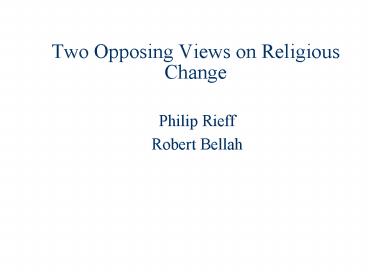Two Opposing Views on Religious Change - PowerPoint PPT Presentation
1 / 12
Title:
Two Opposing Views on Religious Change
Description:
... the moralistic sense of a way of life or set of values to affirm ... The exquisite truth is to know that it is a fiction and that you believe in it willingly. ... – PowerPoint PPT presentation
Number of Views:102
Avg rating:3.0/5.0
Title: Two Opposing Views on Religious Change
1
Two Opposing Views on Religious Change
- Philip Rieff
- Robert Bellah
2
Rieff The Triumph of the Therapeutic
- Religion has become therapeutic rather than
authoritative - It reflects a general cultural trend in which
there are no absolute standards - There are few positive communities
- Built on bonds of commitment to a common symbolic
- Instead, we are a society of negative
communities - United around information and services
3
Freud/psychoanalysis
- Therapy has no doctrine of the good life
- Rather, it is nondirective, non-preachy
- The goal of therapy is to make the individual a
self-determining being - Therapy typically teaches the individual to be an
artist of his/her own life - Freuds goal was to enhance the patients ability
to choose - There was no cure in the moralistic sense of a
way of life or set of values to affirm
4
The goal of psychoanalysis, according to Rieff is
- To limit the power of the community over the
individual - To resist all external moralizing (and instead
attend to ones personal goals/desires) - There is no corporate salvation
- I.e., identified with a group or ideology
- Meaning is what you create for yourself
5
Psychological Man (modal character type of our
time)
- Individualistic (self is the prime center of
value) - Emphasis on remission and release rather than
renunciation - Uninterested in a unified worldview
- Partial insights only
- Live guiltlessly (being your own judge)
6
Implications for religion of this shift in
character type
- Death of book religions (Judaism, Christianity,
Islam) - Rise of religions that celebrate
self-fulfillment, self-actualization - Rise of new barbarism
- Rieff thinks that it is infantile to think that
one can have/do everything - Faith, says Rieff, requires interdicts (I.e.,
limits, restrictions, rules and principles) - Truth cannot say yes to every alternative
7
Robert Bellah Beyond Belief
- He rejects literalistic, non-metaphorical
interpretations of religion - Religion is always symbolic
- There is a mysterious, non-cognitive element to
the deepest expressions of religion - Therefore, religious truths cannot be frozen in
creeds, theological systems, or institutional
structures - Symbols point beyond themselves to some larger
reality
8
Two approaches to religion
- Historical realism (which he rejects)
- Non-metaphorical, literalistic approach to
religion (attempting to represent history/truth
as it was) - E.g., literal stories of origin of world,
resurrection - Symbolic realism (which he endorses)
- Sacred scriptures contain stories, images, and
myths that point beyond themselves to more
universal truths and realities
9
Unbelief in contemporary culture
- The inability to accept the literalism of old
myths correlates with a rise in literacy and
education - There is no necessary tension between science and
religion (unless one takes a literalistic view of
sacred texts) - Religion is that set of symbolic forms by which
one comes to terms with his/her fate
10
Wallace Stevens (quoted by Bellah)
- The final belief is to believe in a fiction,
which you know to be a fiction, there being
nothing else. The exquisite truth is to know
that it is a fiction and that you believe in it
willingly.
11
Thomas Luckmann The Invisible Religion
- The most revolutionary trait of modern society is
that personality and truth are cultivated in the
private rather than public sphere - Individual is left to his/her own devices in
choosing goods, services, friends, and ultimate
meanings - Individual is a buyer purchasing elements of
identity
12
Implications of Luckmanns theory for religion
- Religion has become a private phenomenon
- Truth is something that is marketed rather than
taught - Religion is taking its marketing cues from the
demands of its potential audience - Thus completely reversing the locus of authority
(and, potentially, the integrity of the product)































